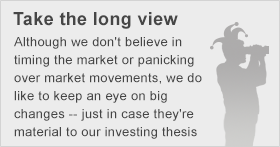
The Dow Jones Industrial Average (^DJI +0.16%) had risen roughly 86 points as of 11:30 a.m. EDT. AT&T (T +0.66%) led the index higher after announcing a new initiative that could eventually devastate Gogo's (GOGO 2.34%) business. Meanwhile, Apple (AAPL +0.51%) posted a small loss following a slight adjustment to its product strategy.
Consumer confidence disappoints
Perhaps helping to limit the Dow Jones' gain, the Conference Board's latest reading of consumer confidence, at 82.3 for April, fell short of the 83 estimate from economists.
The reading on consumer confidence is just one data point, and a relatively minor one at that, yet less-confident consumers are still a poor sign for the U.S. economy, and by extension its stock market. Investors, however, do not appear to be putting much stake in the data, as they bid up the Dow Jones.
AT&T targets Gogo's business
Gogo wasn't benefiting from the broad market's rise, losing more than 22% of its value in morning trading. Since its IPO last year, Gogo has been a particularly volatile stock, experiencing wild swings from time to time, but the drop on Tuesday wasn't the result of random activity.
On Monday, AT&T announced that it would move to offer Wi-Fi on airplanes as early as next year via its 4G LTE network. That would pose a major threat to Gogo, as the company's business depends almost entirely on charging airline passengers for the ability to access the Internet. Gogo has contracts with many of the major airlines, but AT&T could step in over time as those deals expire.

Source: Wikimedia Commons.
Apple cuts Mac prices
Generally speaking, investors focus almost exclusively on Apple's iPhone and iPad sales when the company reports quarterly earnings. This makes sense, as those two businesses account for the vast majority of Apple's revenue and profit.
But as sales of Apple's smartphones and tablets have grown, Mac sales have also increased. Apple's share of the traditional PC market could continue to tick up in the coming months, in light of the company's new pricing policy.
On Tuesday, Apple cut the price of its MacBook Air by $100 each. The cheapest MacBook now retails for $899 -- previously, consumers had to pay a minimum of $999 to purchase one of Apple's laptops. Historically, Apple's share of the PC market has been limited, as its MacBooks have been much more expensive than the competition. But as Apple works to reduce the price of its Macs, it could gain share of the market at its competitors' expense.








